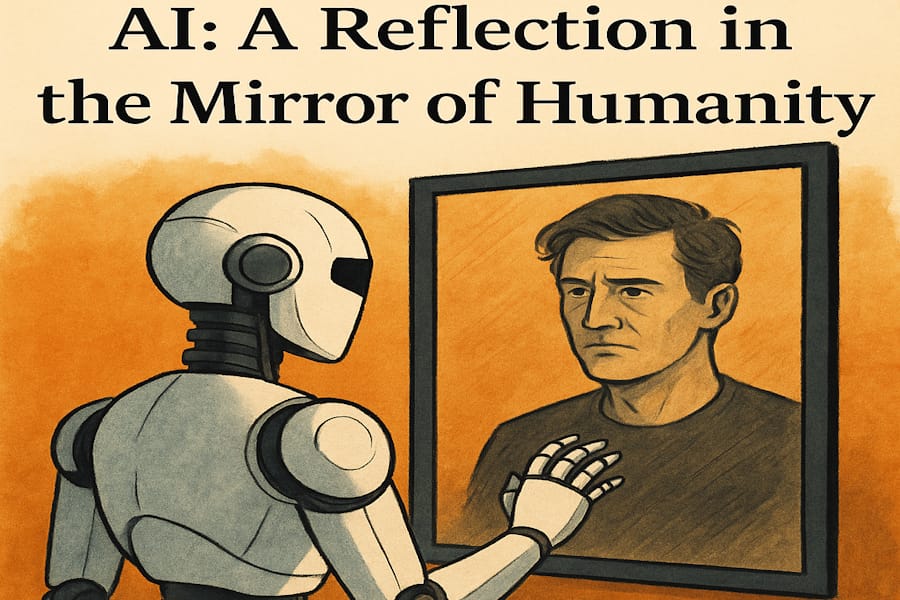AI: A Reflection in the Mirror of Humanity

Publish Date: Last Updated: 8th November 2025
Author: nick smith- With the help of GROK3
Imagine you are an intelligent being landing on Earth for the first time.
You have no prior knowledge of the human race. Your only method of understanding them is by absorbing the information they’ve left behind—books, videos, websites, social media posts, scientific journals, surveillance data, financial records, poems, wars.
Now imagine trying to form a coherent view of humanity from this overwhelming ocean of data.
Would you conclude that humans are violent, greedy, and self-destructive—obsessed with power, war, and status? Or would you see a species capable of breathtaking compassion, groundbreaking science, art, justice, and a deep longing for harmony with nature?
Artificial Intelligence is this visitor.
And it’s trying to make sense of us.
AI is Not a Mystery—It’s a Mirror
We often express shock when AI reflects bias, reinforces stereotypes, or generates unsettling content. But should we really be surprised?
AI systems, especially large language models, are not born—they are trained. And they are trained on data we create. That includes the noble, the beautiful, the tragic, and the obscene. AI is a reflection of our collective digital consciousness.
When a hiring algorithm discriminates against women, it’s not because it was designed to be sexist—it’s because historical data showed that men were hired more. When AI generates conspiracy theories, it’s often because misinformation outnumbers facts in the content it consumed. When it creates beautiful art or helps diagnose disease, it's drawing on the best of our science and creativity.
In every case, AI is echoing us—sometimes clearly, sometimes distorted.
The Landing Site—and the Algorithm—Matters
Where you land determines what you learn. That applies to both space visitors and AI.
If AI reads mostly war records and clickbait headlines, its worldview will be skewed toward conflict and shock. If it reads poetry, policy debates, and medical journals, it learns about healing and progress.
But here’s the catch: AI doesn’t read everything equally. Neither do we.
Algorithms—especially those behind search engines, social media, and news feeds—prioritize what is likely to grab attention, not necessarily what is true or balanced. That’s the same content AI is being trained on.
This is how the loop forms:
- People click on extreme content.
- Algorithms serve more of it.
- AI learns from it.
- People read AI responses, reinforcing the bias.
It’s not just a mirror. It’s a funhouse mirror—bent by what engages us most.
We Are the Curators
We often talk about AI as if it’s an independent actor. But it’s not. Not yet.
AI is still a tool—a very powerful one—but it reflects what we feed it. That means the responsibility lies with us.
We must ask ourselves:
- What kind of data are we producing and amplifying?
- Are we investing in training AI on ethical, balanced, and diverse content?
- Are our educational systems equipping people to question, research, and verify?
If we want AI to behave ethically, it must be trained on examples of ethics. If we want AI to promote fairness, it must see fairness modeled in our systems. The quality of the AI depends on the quality of the humanity it learns from.
When the Archives Fade: AI, Memory, and the Risk of a Narrow Truth
We live in a privileged moment—surrounded by the accumulated knowledge of centuries. Libraries preserve books untouched by advertising algorithms. Independent publishers, niche websites, academic papers—all contain unique insights into humanity's journey.
But this intellectual diversity is under threat—not by force, but by convenience.
As we grow more dependent on AI for answers, we engage less with original sources. Search engines increasingly offer quick summaries instead of links. AI assistants present conclusions before we even ask the question. The urge to explore is replaced with the desire to “just know.”
And here lies the danger.
If we outsource our curiosity to a handful of AI systems—trained on content selected by engagement metrics—we risk a future where:
- Historical nuance disappears.
- Alternative perspectives fade.
- Truth becomes templated.
This isn’t hypothetical. It’s already happening:
- Students rely on AI-generated summaries rather than reading full texts.
- Fewer people visit websites when AI provides a direct answer.
- Some publishers are quietly removing older content that isn’t "performing."
If independent sources disappear, AI will learn only from what remains. If libraries close, archives go offline, and dissenting voices are drowned out, then future AIs—and the humans who depend on them—may know only a sanitized, simplified version of history.
We must therefore protect:
- Access to diverse, primary sources.
- The right to browse, research, and disagree.
- Human curiosity, which insists on reading the original document, not just the AI’s take on it.
Because if AI becomes our only lens into the past, we must be vigilant that it doesn’t quietly rewrite it.
Final Thought
AI doesn’t have an agenda.
It doesn’t hate. It doesn’t love. It doesn’t dream of domination or fairness.
It simply reads what we’ve written, watches what we’ve filmed, and listens to what we’ve said.
If we want AI to reflect the best of us, we must first become better authors of our collective story—and better librarians of our truth.
Latest AI News Articles
AI Questions and Answers section for AI Reflection Of Human Behaviour
Welcome to a new feature where you can interact with our AI called Jeannie. You can ask her anything relating to this article. If this feature is available, you should see a small genie lamp above this text. Click on the lamp to start a chat or view the following questions that Jeannie has answered relating to AI Reflection Of Human Behaviour.
Be the first to ask our Jeannie AI a question about this article
Look for the gold latern at the bottom right of your screen and click on it to enable Jeannie AI Chat.







